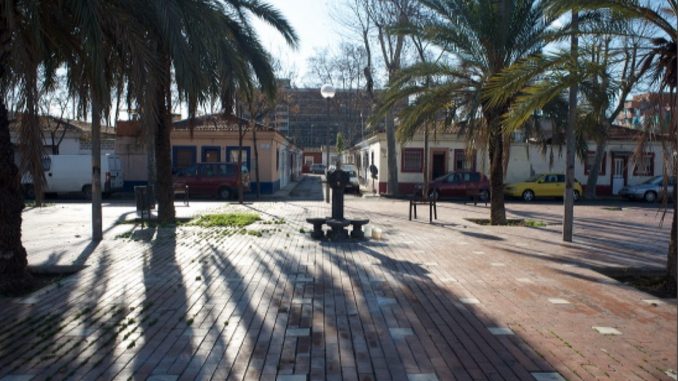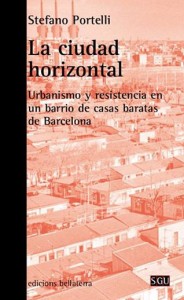
 After Pere López Sánchez’s Rastros de rostros en un prado rojo (y negro) (Virus, 2014), about the neighborhood of ‘casas baratas’ (cheap houses) of Can Tunis in the Thirties, now we have Stefano Portelli’s La ciudad horizontal (Bellaterra, 2015), a research on Bon Pastor’s ‘casas baratas’, from their construction in 1929 until the start of their demolition between 2007 and 2012. These peripheral areas, neglected by economy, criminalized by politics, stigmatized by society, are also ignored by research: mainly because, as in many other working class neighborhoods, it is impossible to do a serious fieldwork there without getting involved, without challenging the existing barriers, without revealing clearly – horizontally – what are the aims behind the research itself. In this case, those are evident: to influence urban planning, in particular to stop the demolition of the neighborhood, and to demand an active role for the residents in the decisions over the transformations of their territories. A very different thing than what they call ‘neighborhood participation’.
After Pere López Sánchez’s Rastros de rostros en un prado rojo (y negro) (Virus, 2014), about the neighborhood of ‘casas baratas’ (cheap houses) of Can Tunis in the Thirties, now we have Stefano Portelli’s La ciudad horizontal (Bellaterra, 2015), a research on Bon Pastor’s ‘casas baratas’, from their construction in 1929 until the start of their demolition between 2007 and 2012. These peripheral areas, neglected by economy, criminalized by politics, stigmatized by society, are also ignored by research: mainly because, as in many other working class neighborhoods, it is impossible to do a serious fieldwork there without getting involved, without challenging the existing barriers, without revealing clearly – horizontally – what are the aims behind the research itself. In this case, those are evident: to influence urban planning, in particular to stop the demolition of the neighborhood, and to demand an active role for the residents in the decisions over the transformations of their territories. A very different thing than what they call ‘neighborhood participation’.
Book:
Stefano Portelli, La ciudad horizontal: urbanismo y resistencia en las casas baratas de Barcelona, Editorial Bellaterra, Barcelona, 2015 [PDF/paper]
Some links:
- [Article] (in catalan) “La ciutat horitzontal”, Revista de Etnología de Catalunya n.39, june 2014, about the research from which this book was born, the project “Social struggle and collective memory in the cheap houses” promoted by IPEC :: [post] on the blog Etnologia.cat :: [post] on ICA‘s webblog
- [Article] “La penetración de los dispositivos de control en un barrio impermeable de la periferia de Barcelona”, Actas del XIII Coloquio Internacional de Geocrítica, Barcelona, may 5-10, 2014. The change in the physical space is closely associated with several social transformations: to the urban verticalization represented by the new housing blocks, corresponds a ‘verticalization’ of the control over the space of the neighborhood.
- [project] Closely linked with this research, Repensar Bonpastor is an international and interdisciplinary competition of ideas to find alternative solutions for the ‘casas baratas’. It was reviewed in 2012 by Denise Lawrence-Zuniga in American Anthropologist.
The web laciutathoritzontal.org is online! It has tens of documents, hundreds of articles, thousands of photos on the neighborhoods of casas baratas in Barcelona!